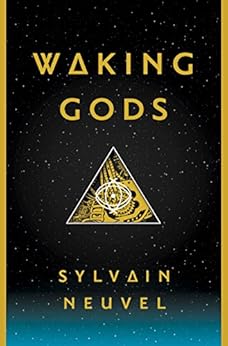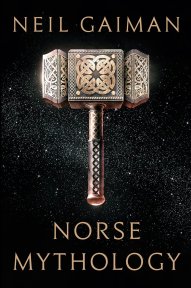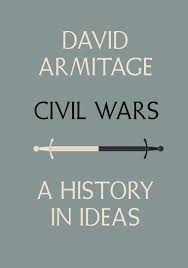 I’ve been trying to write this review for a little while now. I had a draft, tossed it out, googled “how to write a book review” (I kid you not) and then came back to this again.
I’ve been trying to write this review for a little while now. I had a draft, tossed it out, googled “how to write a book review” (I kid you not) and then came back to this again.
I think I’m struggling because I’m finding it hard to come to a conclusion about how I feel about the book. I felt completely differently about the story at the end of the book than I did at the beginning, and I’m not sure if that’s because I always struggle with time travel plots, or if it’s because the premise of the story was excellent, but the execution was lacking.
At the beginning of the story, we meet Tom Barren. Tom lives in the future that the 1950’s thought we would have. They have an unlimited supply of renewable energy, flying cars, and there are thousands of inventions to dramatically improve their everyday lives. As Tom’s father works tirelessly for the next big scientific breakthrough, Tom struggles to fit in and find his place. In a dramatic turn of events, Tom gets caught up in his father’s work, gets transported back in time (and there is some great stuff in this section about why time travel is difficult), and changes the world. Now he’s stuck in “our world”, but soon discovers that it’s maybe not as bad as he initially thought.
What I found particularly compelling about the story was the science that apparently makes all of this possible. The Gottreider Engine is a fictional machine that is the source of energy in the novel, and underpins the entire narrative. It works by harnessing the motion of the Earth through space to generate unlimited power. This source of clean energy is what makes Tom’s world so different and more advanced than ours, and had me convinced that it was a brilliant idea. I haven’t read something like this in fiction before which was refreshing, but the concept has the allure of a Dyson Sphere about it, which is familiar. It’s so big and unwieldy that I can’t fathom actually creating one, but had me wondering if it was theoretically possible. In my mind, this is the key to great science fiction.
I was hooked by chapter two, and raced through the next couple hundred pages. Somewhere along the way, I began to lose interest. It wasn’t a chore to finish by any means, but I wasn’t invested in the character anymore, and while I wanted to know how it all ended, I didn’t find myself drawn to my laptop and wanting to spend all my time reading this book. And I think this is where the time travel elements of the plot bogged me down. As Captain Janeway (the source of all wisdom) said,”Time travel. Since my first day on the job as a Starfleet captain I swore I’d never let myself get caught in one of these godforsaken paradoxes – the future is the past, the past is the future, it all gives me a headache.”

What ends up happening is that I try to logic the situation and keep everything straight, and I think that’s the job of the author. The reader should be able to just enjoy the story and not need to create themselves a timeline to follow along. And this plot wasn’t even *that* complicated. I just didn’t want to think about it. And that really slowed me down.
The tone of the writing was great throughout. Mastai has spent years as a screenwriter and it really shows. Tom is speaking directly to the audience for much of the story and he’s honest, crass, at times witty and at other irreverential. But this all serves to draw you into the story and to care about him. He also does some interesting things with the structure of the story that pay off later and I really appreciated that.
At around the halfway mark, there were some interesting discussion between the character about time travel, parallel worlds, and how it all might work. Some of it is based on scientific theories I’m familiar with (insomuch as a lay person can be familiar with quantum physics) and some of it was more philosophical and I loved it all. It was a smart way to break up the frantic pacing and do some character development. In particular:
“We didn’t have the resources to actually make the stuff we came up with, so we stuck them in our science fiction. We kept them safe in our dreams. And then you assholes raided our imaginations, took credit for our ideas, and built yourself a paradise.”
So for me, the second half of the book struggled to keep my interest and I struggled to care as much as I had in the first half. And as I got closer to the ending, I found myself feeling a familiar sense of dread. The writer has spent hundreds of pages developing a world and the rules that govern it, and now they have to wrap everything up in a way that is both convincing yet original. And inevitably, they are doomed to fail on at least one account.
I don’t want to spoil anything, but the end just felt too neat, like a perfectly wrapped gift. I like having a bit of a mess left over. You can’t mess with time and space and then just expect it to all work out. You might argue that it wasn’t tidy and clean for all characters, but I didn’t really care about them anyway, so the painful bits just didn’t land for me. If I was to predict the future, the things about this book that will stay with me will be the Gottreider Engine and the science-y bits about time travel. The characters will fade and I likely won’t even remember the ending.
 I’m actively looking to diversify my reading, especially in genres where minority voices are not always heard, and diverse characters are not always seen. I jumped at the chance to read an advance copy of this title and wasn’t disappointed. Sometimes nothing is better than curling up for the afternoon with a book you know you’re going to race through and enjoy in a single afternoon. This book was exactly what I was looking for.
I’m actively looking to diversify my reading, especially in genres where minority voices are not always heard, and diverse characters are not always seen. I jumped at the chance to read an advance copy of this title and wasn’t disappointed. Sometimes nothing is better than curling up for the afternoon with a book you know you’re going to race through and enjoy in a single afternoon. This book was exactly what I was looking for. Waking Gods is the second book in the Themis Files series. I will not be including any spoilers for this book, but there might be some slight spoilers from Sleeping Giants. If you haven’t come across this series before, or are waiting for it to be complete before diving in, fair warning. But also, if you haven’t started the series yet, WHYYYY.
Waking Gods is the second book in the Themis Files series. I will not be including any spoilers for this book, but there might be some slight spoilers from Sleeping Giants. If you haven’t come across this series before, or are waiting for it to be complete before diving in, fair warning. But also, if you haven’t started the series yet, WHYYYY.

 I feel like I can’t really start this review until I come clean about my experience reading Neil Gaiman. It’s a story fraught with DNFs and secret shame. And because this intro is going to take a couple of paragraphs and you likely just want to know what I thought, I’ll tell you up here that it was great. Go read it.
I feel like I can’t really start this review until I come clean about my experience reading Neil Gaiman. It’s a story fraught with DNFs and secret shame. And because this intro is going to take a couple of paragraphs and you likely just want to know what I thought, I’ll tell you up here that it was great. Go read it. This book is different from what I usually review. I want to give fair warning to anyone reading this that Civil Wars is very much an academic text. I don’t say this to make it sound dry or boring, because it was neither of those things, but I know that this won’t appeal to everyone. I love footnotes and new ideas presented to me as an essay or thesis, so if you feel the same, read on fellow nerd, read on.
This book is different from what I usually review. I want to give fair warning to anyone reading this that Civil Wars is very much an academic text. I don’t say this to make it sound dry or boring, because it was neither of those things, but I know that this won’t appeal to everyone. I love footnotes and new ideas presented to me as an essay or thesis, so if you feel the same, read on fellow nerd, read on. I’ve been trying to write this review for a little while now. I had a draft, tossed it out, googled “how to write a book review” (I kid you not) and then came back to this again.
I’ve been trying to write this review for a little while now. I had a draft, tossed it out, googled “how to write a book review” (I kid you not) and then came back to this again.
 On New Year’s Eve 1984, Lillian Boxfish takes a walk. It’s a simple premise that serves the narrative well. What follows is the story of a life fully lived, told in roughly chronological flashbacks as Lillian moves through the neighbourhoods of her past.
On New Year’s Eve 1984, Lillian Boxfish takes a walk. It’s a simple premise that serves the narrative well. What follows is the story of a life fully lived, told in roughly chronological flashbacks as Lillian moves through the neighbourhoods of her past.

 I tend to get a craving for a good mystery in the fall and winter months, when all I want to do is bundle myself in flannel and wool and drown my cold-weather sorrows in tea. It’s all very cozy, but I don’t like cozy mysteries. I like them visceral and shocking and knee-deep in the criminal psychology, or I like to follow a familiar detective around as they solve the latest crime in their own unique way. This book falls into the latter category, though I would argue that Robinson always does a good job of explaining the motivations of his characters.
I tend to get a craving for a good mystery in the fall and winter months, when all I want to do is bundle myself in flannel and wool and drown my cold-weather sorrows in tea. It’s all very cozy, but I don’t like cozy mysteries. I like them visceral and shocking and knee-deep in the criminal psychology, or I like to follow a familiar detective around as they solve the latest crime in their own unique way. This book falls into the latter category, though I would argue that Robinson always does a good job of explaining the motivations of his characters.
 His Bloody Project: Documents relating to the case of Roderick Macrae is great. Let’s start with that. Shortlisted for the Man Booker Prize, this work of fiction (yes, it’s fiction, but I had to double check after the first couple of pages) tells the story of a bloody triple-murder in a remote farming community in Scotland in 1869 as told through witness testimony, medical examiner’s reports, trial transcripts, and the confessions of Macrae himself.
His Bloody Project: Documents relating to the case of Roderick Macrae is great. Let’s start with that. Shortlisted for the Man Booker Prize, this work of fiction (yes, it’s fiction, but I had to double check after the first couple of pages) tells the story of a bloody triple-murder in a remote farming community in Scotland in 1869 as told through witness testimony, medical examiner’s reports, trial transcripts, and the confessions of Macrae himself.